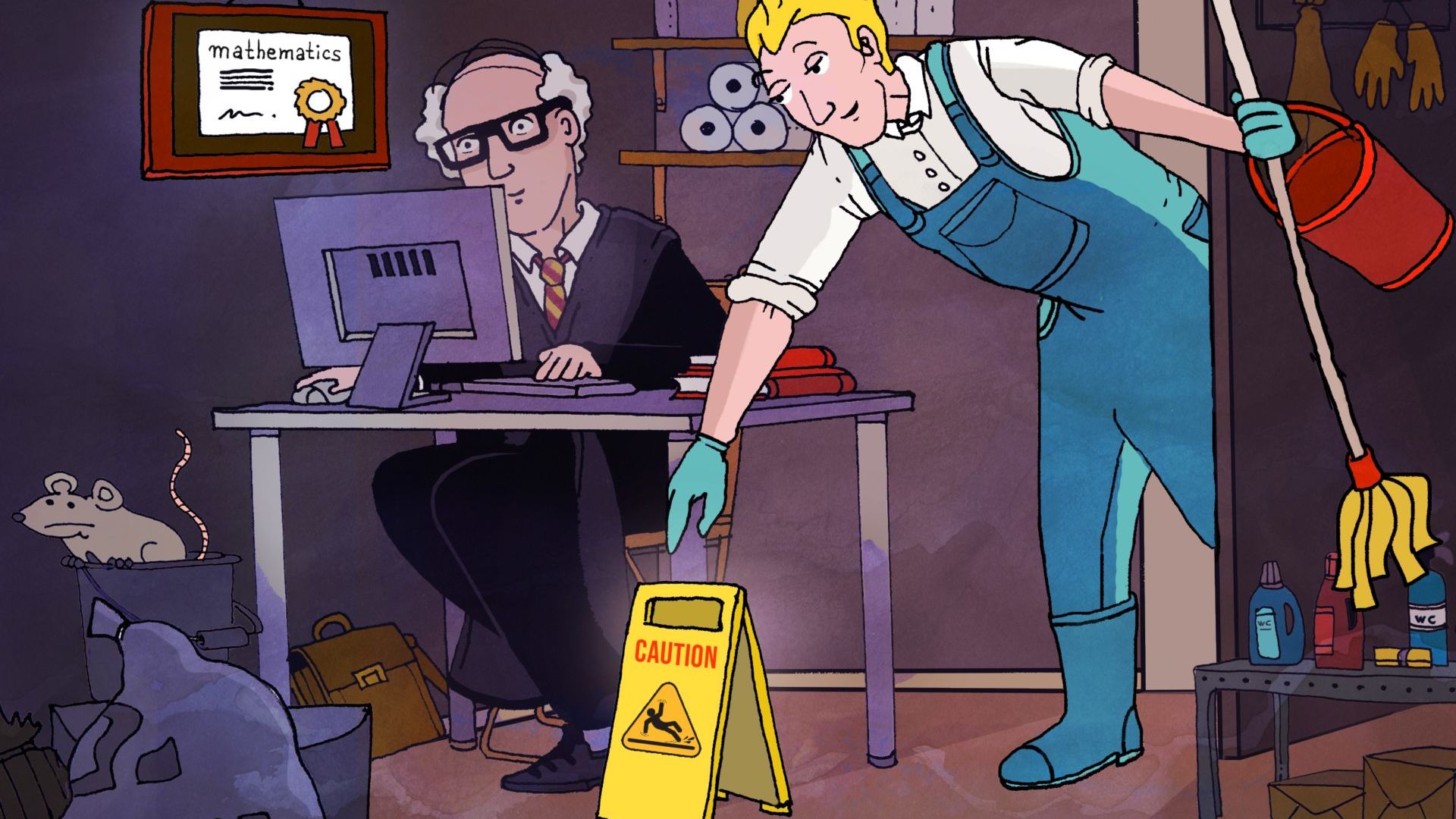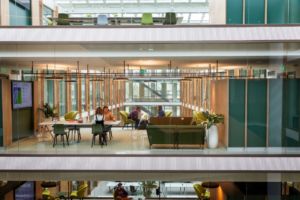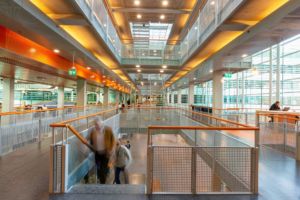Limits to growth (3): The professor holds office in the broom cupboard
-
 Illustration: Ivana Smudja
Illustration: Ivana Smudja
Every year Radboud University grows a little bigger. How do fuller lecture halls impact teaching, student life and the city of Nijmegen? In the Limits to growth series, Vox explores the university’s growing pains. Today, Part 3: Some faculties, including the Faculty of Science, are bursting at the seams.
He has certainly noticed that there are limits to growth, says Eric Cator, Director of the Institute for Mathematics, Astrophysics and Particle Physics (IMAPP) at the Huygens building, with a smile: ‘Thanks to the Dutch government’s sector plans for investing more in science and technology, we’ve hired a lot of new people over the past years,’ he says. ‘Mathematics has seen its staff numbers increase by 20%.’
 Limits to growth
Limits to growth
In the coming weeks, Vox will highlight the steady growth of the university. This is the second article in the series.
1. The growing pains of the university
2. Active student life under pressure
3. Fighting for office space
4. The sports centre is bursting at the seams
5. The explosion of psychology in 2016
6. Is the campus still easily accessible?
7. Lecture halls full of unhappy students
8. Student recruitment without growth ambitions
The downside is that the Huygens building has not grown along to accommodate these figures, and has at present no room for extensions. Over the past years, the number of square metres per fulltime staff member in the building has already dropped from 15 to 10. ‘Things are getting tight,’ says Cator.
Sign-up list
The IMAPP institute has devised an original solution for the shortage of space. By refurbishing lecture and meeting rooms as offices, they try to provide as many staff members as possible with their own office. ‘The Faculty Board is not particularly delighted about it,’ says Cator. ‘It costs money and the modifications to the offices may have to be reversed in the future.’
Still, Cator finds it important that as many of his people as possible have their own space. ‘Our work is mostly thinking, so it’s important to be able to sit quietly at your desk,’ he says. ‘Plus, we have a lot of one-on-one appointments with students, which is difficult when you share a room with someone.’
The only group that does not get their own room at the IMAPP are PhD candidates. They have to share an office with a maximum of six people. The busiest rooms use a system with a sign-up list, to avoid having too many people in the office at once. Cator says it works, but it does encourage PhD candidates to work from home more.
The greatest victims of the space shortage are retired staff members. Before the pandemic, they used to come to campus nearly every day, and would sometimes teach a lecture, but now they have been thanked for services rendered and sent home. Cator: ‘It’s painful; some of these people were part of the Institute for as long as sixty years.’
‘Pretty full’
IMAPP’s story sounds familiar to Associate Professor and Works Council member Inge Bleijenbergh. ‘We’re bursting at the seams in all directions,’ she says in her office at the Elinor Ostrom building, a cosy room filled with houseplants. ‘Our staff is growing fast and it’s quite a challenge each time for the student administration staff to find rooms that are big enough to house large groups of students.’
Bleijenbergh has noticed that new staff members, especially PhD candidates and postdocs, tend to be assigned the smallest workplaces. Including rooms that were originally intended for joint consultations, but are now occupied by staff members who are often forced to share them. According to the Works Council member, aside from the Elinor Ostrom building, space shortage is most acute in the Huygens building, and – interestingly enough – in the brand-new Maria Montessori building.
‘We have a lot of part-timers, and the campus is much emptier on Wednesday afternoons and on Fridays’
The Executive Board is aware of the problems. And yet, according to Rector Magnificus Han van Krieken, at present there isn’t a shortage of workplaces on campus. ‘Some buildings, like the Huygens building, are indeed pretty full,’ he says. ‘But most places on campus aren’t facing a severe shortage of space. We have a lot of part-timers, and the campus is much emptier on Wednesday afternoons and on Fridays.’ This is neither desirable nor sustainable, according to the Rector. ‘I’m curious how many people will continue to work from home once the pandemic is over.’
At the same time, Van Krieken knows that the buildings don’t have much margin left. ‘We still have quite a few vacancies to be filled,’ he says. ‘Once that happens, and everyone returns to campus after the pandemic, things will get much busier.’
Beautiful study
In any case, working from home will remain an option for many Radboud University staff members, also after the pandemic. ‘I hear from many staff members – and this certainly also applies to me – that they enjoy working partly from home,’ says Van Krieken. ‘This is something we want to facilitate.’
‘Before the pandemic, our policy was: everyone works on campus, unless… But people will be able to continue to work from home more, in consultation with their supervisor.’ The financial allowance scheme for creating a suitable home office that was initiated during the COVID-19 pandemic will remain, says Van Krieken.
‘Working from home should be one of the options, not a precondition for being able to do your work well’
Bleijenbergh is in favour of people being able to continue to work from home in future, but she warns that this will not solve the space shortage. ‘I’m very concerned about working from home being presented as a solution for space shortage. It should be one of the options, not a precondition for being able to do your work well.’
An often-heard argument for working from home is that it makes it easier for staff members to share rooms by alternating their days on campus. That’s not right, says Bleijenbergh. ‘Most staff members – especially those with young children – want to work on campus on Mondays, Tuesdays, and Thursdays. This is also when all meetings are planned. People who share offices are often on campus on the same days. On other days, the campus is much emptier.’
Campus plan
Will the Faculty of Arts be getting a new building at last? Will student accommodation be created at the Erasmus building? Will the Huygens building be extended with a fifth wing? And what will happen to the vacant sections of the Spinoza building? The new campus plan, which the Executive Board has been working on for a few years now, will hopefully answer these and other questions concerning housing and space shortage. The plan is expected to be ready this spring. ‘We would have liked to have completed it earlier, but we’ve accrued some delay, due to the pandemic and other factors,’ says Rector Han Van Krieken.
Van Krieken emphasises that the Executive Board does not see working from home as a solution for the shortage of space on campus. ‘It wouldn’t work anyway, due to the previously mentioned peak hours on campus,’ he says. ‘Plus, we believe that in future, research and teaching should continue to be possible simultaneously on campus.’
Bleijenbergh advocates that priority should be given to staff members at the bottom of the hierarchy when assigning office space. ‘PhD candidates and postdocs often have to make do with a less adequate workplace, as a result of which they end up working from home more,’ she says. ‘And that while the housing shortage also means that they often have to pay a lot of money for a small apartment, without a proper home office. Professors and assistant professors can usually afford a house with a nice study. Now PhD students sometimes have to share a room with eight colleagues, but actually, it’s the professors and assistant professors who should do that.’
Van Krieken agrees. ‘The activity should be the main factor in determining the workplace, not the hierarchy.’
This is exactly the approach taken at IMAPP, says Eric Cator. ‘I’m a Professor in Mathematics myself, and I hold office in the department’s broom cupboard, a small room with no window. PhD candidates get the biggest rooms, although they do have to share them.’
No open plan offices
An obvious solution for the shortage of space is to commission new campus buildings, but this is not something the Rector is ready to discuss. He is waiting for the campus plan (see box), which is currently being prepared and should be ready this spring. What he does want to say is this: if new buildings are included in the plan, they will be organised as flexibly as possible. ‘You can see this happening step by step: the Maria Montessori building is already more flexible than the Elinor Ostrom building, which is in turn more flexible than the Grotius building.’

But real open plan offices – the nightmare of many academics, who ideally want a room of their own, with a library and a place where students can easily find them – are not in the pipeline, according to the Rector. Van Krieken does have an example in mind of how things could look: the School of Sport and Exercise of the HAN University of Applied Sciences, located beneath the Radboud Sports Centre. ‘It’s a great combination of quiet offices and group work rooms, as well as more open spaces. This could be a solution for us too.’
A few extra rooms
This is not likely to solve IMAPP’s problems. The only long-term solution seems to be adding a fifth wing to the Huygens building. This option is under consideration, as Dean Sijbrand already confirmed in an interview with Vox. ‘This fifth wing is important for the entire faculty, even if it means a higher rent,’ agrees Cator. ‘As it stands, we would be delighted with a few extra rooms.’
According to Cator, the solution ultimately lies with the government. ‘They are the ones who lay down conditions for science and make funding available to facilitate it. But this money is only intended for attracting new people, not for creating more workplaces. Hopefully this will be adjusted in future.’




